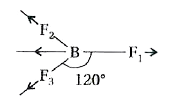Which of the following molecules is polar and possesses zero dipole moment ?
A
Cl2
B
BF3
C
NH3
D
HCl
Text Solution
The correct Answer is:B
BF3

The shape is triangular planar , F - B - B = 120∘,μ=0 D
In BF3 molecule, there are three polar B - F bo nds present because the electronegativity of F(4 .0) is more then B(2.0) but hybridization of B in BF3 is sp2 so the shape is triangular planer.
B - F bond is planar but it has regular shape . All vector component each other so it is non polar.
|
Topper's Solved these Questions
- CHEMICAL BONDING AND MOLECULAR STRUCTUREBOOK - KUMAR PRAKASHANCHAPTER - CHEMICAL BONDING AND MOLECULAR STRUCTUREEXERCISE - SECTION -D (SOLUTIONS OF NCERT EXEMPLAR PROBLEMS) (MCQs)
22 Videos
- CHEMICAL BONDING AND MOLECULAR STRUCTUREBOOK - KUMAR PRAKASHANCHAPTER - CHEMICAL BONDING AND MOLECULAR STRUCTUREEXERCISE - SECTION -D (SOLUTIONS OF NCERT EXEMPLAR PROBLEMS) (MCQs (MORE THAN ONE OPTIONS))
8 Videos
- CHEMICAL BONDING AND MOLECULAR STRUCTUREBOOK - KUMAR PRAKASHANCHAPTER - CHEMICAL BONDING AND MOLECULAR STRUCTUREEXERCISE - SECTION - C (MCQs ASKED IN JEE /NEET /AIEEE)
31 Videos
- CLASSIFICATION OF ELEMENTS AND PERIODICITY IN PROPERTIES BOOK - KUMAR PRAKASHANCHAPTER - CLASSIFICATION OF ELEMENTS AND PERIODICITY IN PROPERTIES EXERCISE - Section -D SOLUTIONS OF NCERT EXEMPLAR PROBLEMS (Long Answer Type Questions )
7 Videos
Similar Questions
Knowledge Check
Which of the following molecules will have polar bonds but zero dipole moment?
ANF3BSF4CCF4DF2Which of the following molecules will have polar bonds but zero dipole moment ?
AO2BCHCl3CCF4Dnone of theseWhich of the following molecule is polar (i.e., has permanent dipole moment)?
AH2C=C=CF2BH2C=C=C=CF2CCl−H∣C∣H−ClDSO2
Which of the following molecules has zero dipole moment?
View SolutionWhich of the following molecules has a dipole moment of zero?
View SolutionWhich of the following set of molecules will have zero dipole moment ?
View SolutionWhich of the following molecules possess zero dipole moment?
View SolutionWhich of the following molecules has zero dipole moment ?
View Solution
